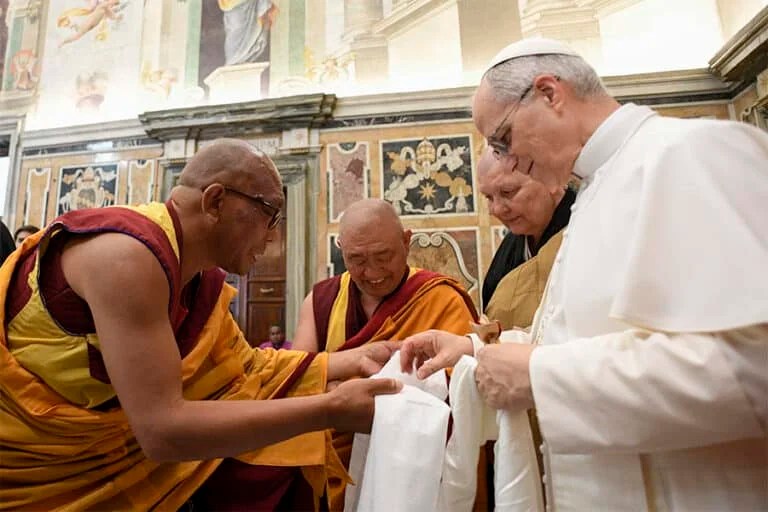A Papacy begins with a hand extended to all
In a remarkable gesture of openness and continuity, Pope Leo XIV convened his first major interfaith and ecumenical audience on May 19, a day after his Inaugural Mass. Held in the Vatican’s Clementine Hall, the gathering united a constellation of religious leaders – from Orthodox, Anglican, and Protestant churches to representatives of Judaism, Islam, Hinduism, Buddhism, Sikhism and Jainism.
The Holy Father made it unmistakably clear: his papacy would carry forward the legacy of dialogue, bridge-building, and spiritual fraternity championed by his predecessors, especially Pope Francis.
A time for dialogue and building bridges
In his address, Pope Leo XIV, the first American-born pontiff, delivered a powerful call for unity, as reported by Vatican News:
“Today is the time for dialogue and for building bridges. I am happy and grateful for the presence of representatives of other religious traditions, who share the search for God and his will, which is always and only the will of love and life for men and women and for all creatures.”
He emphasized that dialogue and synodality – an inclusive, listening-based model of Church governance – are intimately linked, especially when engaging in ecumenical and interreligious efforts.
“Synodality and ecumenism are closely linked. I wish to assure you of my intention to continue Pope Francis’ commitment to promoting the synodal character of the Catholic Church and to developing new and concrete forms for an ever more intense synodality in the ecumenical field.”

On May 19, Pope Leo XIV met with representatives of other Christian churches, and world religions at the Vatican, affirming his commitment to continue Pope Francis’ legacy of ecumenical dialogue and synodality, which means an inclusive, listening-based model of Church governance.
A gesture of gratitude and continuity
The Holy Father spoke with deep affection and reverence for his predecessor:
“Pope Francis promoted both the ecumenical path and interreligious dialogue – above all by cultivating interpersonal relations, so that, without taking anything away from ecclesial bonds, the human trait of the encounter was always valued. May God help us to treasure his witness!”
He reminded attendees that Pope Francis’ work had set the stage for “a culture of dialogue as the path; mutual collaboration as the code of conduct; reciprocal understanding as the method and standard,” citing the historic Document on Human Fraternity co-signed with the Grand Imam of Al-Azhar.
Commemorating Nicaea, pursuing unity in faith
Speaking directly to fellow Christian leaders – including Ecumenical Patriarch Bartholomew I of Constantinople, Orthodox Patriarch Theophilos III of Jerusalem, and Assyrian Patriarch Mar Awa III – Pope Leo XIV invoked the forthcoming 1,700th anniversary of the First Ecumenical Council of Nicaea.
“That council represents a fundamental stage in the development of the Creed shared by all the Churches and ecclesial communities. While we are on the path towards the reestablishment of full communion among all Christians, we recognize that this unity can only be unity in faith.”

He further declared:
“As Bishop of Rome, I consider one of my primary duties to seek the reestablishment of full and visible communion among all those who
Embracing religious diversity – From Krishna to the Buddha
Among the more touching moments was the participation of ISKCON members Bhakta Matteo and Bhakta Alessandro, who gifted the pontiff a copy of Bhagavad-gītā As It Is. The Pope graciously accepted the Hindu scripture, expressing gratitude and reverence while recalling his own seminary readings of the Gita.
This act recalled the legacy of ISKCON founder Srila Prabhupada, who had visited Italy in 1974 hoping to build spiritual connections with the Vatican. The encounter highlighted Pope Leo’s inclusiveness and reverence for spiritual truths beyond Christianity.
The Pope also greeted Buddhist, Jain, Sikh, Brahma Kumari and other spiritual leaders with personal warmth, “In a world wounded by violence and conflict, each of the communities represented here brings its own contribution of wisdom, compassion, and commitment to the good of humanity and the preservation of our common home.”

“In a world wounded by violence and conflict,” said Pope Leo XIV to religious leaders, “each of the communities represented here brings its own contribution of wisdom, compassion, and commitment to the good of humanity and the preservation of our common home.”
Dialogue with Jews and Muslims~ A foundation of shared belief
Highlighting the importance of the “spiritual heritage shared by Christians and Jews,” Pope Leo acknowledged ongoing theological dialogue even amid global tensions. The same spirit extended to Islam, where he affirmed the Church’s commitment to fraternity rooted in mutual respect and freedom of conscience.
“Even in these difficult times, marked by conflicts and misunderstandings, it is necessary to continue with enthusiasm this very precious dialogue of ours,” read a communication from the Vatican Press Office.
A conviction for peace and development
At the conclusion of his address, the Pope issued a forceful call to moral action:
“I am convinced that, if we are in agreement and free from ideological and political conditioning, we can be effective in saying ‘no’ to war and ‘yes’ to peace, ‘no’ to the arms race and ‘yes’ to disarmament, ‘no’ to an economy that impoverishes peoples and the Earth and ‘yes’ to integral development.”
A shared prayer for hope and humanity
With an appeal that rose above doctrinal lines, Pope Leo invited all gathered to invoke divine blessings:
“His infinite goodness and wisdom help us to live as His children and as brothers and sisters to each other, so that hope may grow in the world.”
By anchoring his pontificate in synodality, interfaith engagement, and moral leadership, Pope Leo XIV is charting a fresh course for the global Church – one that honors tradition, embraces diversity, and courageously faces the future.
His message wasn’t just ceremonial – it was catalytic.

